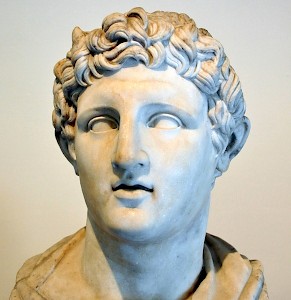Antigonus Monophthalmus - Livius (original) (raw)
This page is a stub. It will be expanded to a full-fledged article.
Antigonus I Monophthalmus (382-301): officer in the army of Alexander the Great, one of the Diadochi. His surname means "one eyed".
Relatives
- Father: Philip
- Wife: Stratonice, daughter of Corrhaeus
- Sons: Philip (c.350-306); Demetrius Poliorcetes (c.337-283)
Main deeds
- 382: Born
- Companion of king Philip II of Macedonia
- 336: Assassination of Philip (text); accession of Alexander the Great
- 334: Invasion of Asia; Antigonus is commander of the Greek hoplites
- 333: Antigonus is made satrap of Phrygia; defeats the Persian armies several times, conquers Lycaonia
- 331: Receives the satrapies of Lycia and Pamphylia
- Fights against the Cappadocian leader Ariarathes.
- 323: Death of Alexander in Babylon (text); settlement of Babylon (text); Antigonus remains ruler of his dominions
- 322: Antigonus refuses to side with Perdiccas and Eumenes; in their successful fight against Ariarathes; flees to Antipater in Macedonia; outbreak of the First Diadoch War (Antipater, Antigonus, Ptolemy Soter, and Craterus against Perdiccas and Eumenes)
- 320: Death of Perdiccas; Conference of Triparadisus (text); end of First Diadoch War; Antigonus restored and made supreme commander of the Macedonian forces in Asia; his task is to defeat Eumenes
- 319: Antigonus besieges Eumenes at Nora (text)
- 318: Outbreak of the Second Diadoch War (Polyperchon and Eumenes against Antigonus and Cassander, son of Antipater)
- 317: Antigonus pursues Eumenes to Gabae (text)
- 315: Antigonus defeats Eumenes; execution of Peithon (succeeded by Nicanor); the satrap of Babylonia, Seleucus, flees to Ptolemy
- 314: Antigonus has become too powerful: outbreak of the Third Diadoch War (Cassander, Ptolemy, and Lysimachus against Antigonus and his son Demetrius); Antigonus declares the Freedom of Greece (text) and starts the siege of Tyre (summer; text)
- 313, summer: Antigonus captures Tyre; the Peloponnese sides with Antigonus
- 312: Ptolemy defeats Demetrius near Gaza
- 311 (May): Seleucus liberates Babylon (text; more); defeat of Nicanor (autumn); the Peace of the Dynasts makes an end to the Third Diadoch War (december), and leaves Antigonus breathing space to declare the Babylonian War;
- 310: Seleucus defeats Demetrius (spring; text); Antigonus in Babylon (autumn)
- 309: Seleucus decisively beats Antigonus
- 307: Outbreak of the Fourth Diadoch War (Ptolemy and Cassander against Antigonus and Demetrius); Demetrius liberates Athens (text)

Demetrius I Poliorcetes
306: Demetrius defeats Ptolemy in the naval battle ofSalamis (Cyprus); Antigonus and Demetrius accept the royal title (text)- 305-304: Demetrius is unable to capture Rhodes (text); proceeds to Greece; Cassander and Ptolemy open negotiations, which Antigonus declines
- 302: Lysimachus invades Asia Minor; he receives support from Cassander and Seleucus
- 301: Battle of Ipsus; death of Antigonus. Asia Minor is for Lysimachus; Asia for Seleucus; Ptolemy seizes Coele Syria; Demetrius keeps Greece.
Succeeded by: Demetrius Poliorcetes
Literature
- R.A. Billows, Antigonos the One-Eyed and the Creation of the Hellenistic State (1990, Berkeley)
- P. Briant, Antigone le Borgne (1973, Paris)
- W. Heckel, The Marshals of Alexander's Empire (1992 London)
- P.V. Wheatley, "The Antigonid Campaign in Cyprus, 306 B.C." in: Ancient Society 31 (2001) 133-56